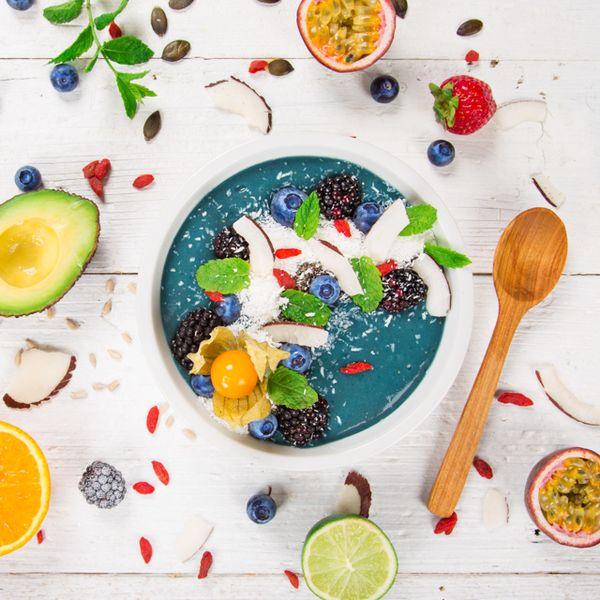18 Science-Backed Superfoods For a Healthier You
Food is the fuel that keeps your body running, and the quality of that fuel significantly influences your overall health and wellbeing. By selecting the right nutrient-dense foods, you can eat your way to better health without sacrificing tasty meals or adhering to a strict diet. This approach simply requires a bit of knowledge, some pre-planning, and a secret weapon known as superfoods.
What are Superfoods?
Superfoods are packed with antioxidants, nutrients, vitamins, and minerals that support vibrant health, which you can both feel and see, as they also promote skin health and anti-aging benefits. Incorporating superfoods into your regular meal plans is straightforward. Simple actions like sprinkling chia seeds into your morning oatmeal or daily salad, adding spirulina to your favorite recipes, incorporating amla fruit into your smoothie, or including a superfood supplement in your routine can significantly enhance your body's premium fuel for flourishing health.
To facilitate the introduction of superfoods into your daily meal plan, we’ve compiled a list of 18 science-based superfoods to add to your diet. Bon appétit!
Spirulina
Spirulina is widely regarded as one of the most nutrient-dense superfoods. Found in warm tropical lakes in Central America and Africa, this blue-green microalgae is rich in potent antioxidants known as carotenoids, which neutralize free radicals and promote health throughout the body. It is also abundant in protein, vitamin B1 (thiamine), vitamin B2 (riboflavin), vitamin B3 (niacin), copper, and iron, along with smaller amounts of magnesium and manganese.1
Research has demonstrated that spirulina offers numerous benefits, including supporting healthy cholesterol levels within the normal range, enhancing antioxidant function, and bolstering immune health.2 Adding spirulina to your diet is easy; spirulina powder can be mixed into recipes, drinks, and smoothies, or you can opt for spirulina tablets and pills.
Amla Fruit
Also known as Indian Gooseberry, amla fruit has been valued by herbal practitioners within the Ayurvedic tradition since ancient times, and modern science supports its merits. This potent superfood berry, native to Southeast Asia, offers a wealth of nutrients, including minerals, amino acids, phenolic compounds, and a substantial amount of vitamin C.
Amla fruit benefits your health by promoting collagen production, providing antioxidant defense against oxidative stress on the skin and liver, supporting joint health, and much more.3 4,5 These delicious berries can be enjoyed on their own, in powdered form for smoothies and drinks, or as amla fruit supplements.
Maqui Berry
If you’re seeking an antioxidant anthocyanin powerhouse that aggressively combats free radicals, maqui berry is an excellent choice. This dark purple South American fruit boasts higher antioxidant levels than acai berry and goji berry, which are also renowned for their antioxidant properties.
The anthocyanins in maqui berry support anti-aging, skin health, eye health, cardiovascular health, digestive function, and more.6 Like amla fruit and spirulina, maqui berry is perfect for smoothies and can also be used in recipes, taken as a maqui berry supplement in powder or capsule form, or eaten on its own.
Chokeberry
The aronia plant, a shrub found in North America, thrives in damp wooded areas and swamps or wetlands and produces chokeberry, one of the most potent superfoods. Occasionally referred to as ariona berries, chokeberries have gained popularity among health and wellness enthusiasts, and rightly so.
Studies have shown chokeberries to offer numerous health benefits, including the ability to promote healthy blood sugar levels already within the normal range, support healthy weight management, enhance antioxidant function, and improve liver and artery health.7,8,9 Moreover, chokeberry is an excellent source of vitamins and minerals including vitamin C, folate, vitamins B-1, B-2, B-6, niacin, vitamin K, pantothenic acid, tocopherols, sodium, potassium, calcium, magnesium, iron, and zinc.
Chokeberry has many culinary uses, including in pies, cookies, and muffins, and can also be made into jams and juices. Chokeberry supplements are also a popular method for incorporating this superfood into your daily routine.
Golden Berries
Although they have surprisingly few calories, golden berries are loaded with the nutrients your body craves, including a wealth of antioxidants. Related to eggplants and tomatoes, golden berries originated in the mountainous regions of South America and have an orangish/yellow hue.
Among their many nutrients are vitamin C, thiamine, niacin, phosphorus, iron, and up to 34 unique compounds.10 Golden berries enhance your health by supporting antioxidant function, immunity, vision health, and may even promote bone health.11 These tasty treats, about the size of cherry tomatoes, are excellent in salads, sauces, or jams.
Seaweed
If you’ve ever ordered sushi rolls, you’re already familiar with seaweed as a culinary delight, but did you know it’s a superfood? Seaweed varieties such as wakame and kelp are rich in naturally-occurring electrolyte minerals like calcium and magnesium, as well as additional minerals like manganese and iron, and are also a rich source of iodine, essential for a healthy thyroid gland. Seaweed is also high in fucoidan, a polysaccharide which supports immune health, skin health, digestive function, and liver and kidney function.12
In addition to numerous culinary dishes, seaweed supplements like Scottish Kelp are a great way to add this superfood to your life.
Mushrooms
If you enjoy mushrooms as a pizza topping, in a salad, or sautéed and served with a steak, you’re in luck, because mushrooms such as shiitake, maitake, and chaga are fantastic superfoods. These mushrooms are adaptogens, helping you counteract the effects of stress.13
While all three mushrooms support antioxidant function and immune health, each offers unique health benefits. For instance, shiitake mushrooms naturally provide vitamin D, enhancing your body’s ability to absorb calcium for strong bones.14
Maitake mushrooms are rich in beta glucans, B vitamins, vitamin C, copper, potassium, fiber, and amino acids.15 Chaga mushrooms, long valued for their abundance of botanical compounds and beta glucans, can enhance heart health and energy.16
There are many ways to benefit from mushrooms, whether by adding them to delicious dishes, taking a daily mushroom supplement, or even trying a health-boosting cup of mushroom coffee.
For a comprehensive understanding of their benefits, consider exploring Top 10 Mushrooms for Better Health and The Health Benefits of Mushrooms.
Chia Seed
Chia seeds rightfully earn their superfood status by offering an array of nutrients that enhance wellness. Historically used by the Aztecs and Mayans to boost energy, these tiny seeds are low in calories and provide a healthy dose of calcium, antioxidants, protein, essential fatty acids, and abundant fiber.17
Chia seeds are excellent for promoting healthy digestion, bone health, skin health, heart health, energy, and maintaining healthy blood sugar levels already within the normal range.17 One of the great advantages of chia seeds is their versatility; they can be added to foods or beverages without affecting the flavor. Chia seeds complement rice, yogurt, cereals, vegetables, and much more, so indulge freely!
Hemp
Often misunderstood, hemp is closely related to the marijuana plant but has no psychoactive effects. Hemp is an extremely versatile plant used for making cordage, fabric, body oils, hemp cooking oils, lotions, and paper, and it also qualifies as a superfood.
Hemp seed, or hemp hearts as they are sometimes known, is a protein-rich source of polyunsaturated fats, fiber, vitamin E, magnesium, riboflavin, folate, and much more.18 The health applications of hemp seed are extensive, including promoting a healthy weight, heart health, bone health, and maintaining healthy blood sugar levels already within the normal range.18 Like chia seeds, hemp seeds are an easy addition to your daily diet and can be used for baking, added to smoothies, salads, cereals, yogurt, or even made into hemp milk.
Pumpkin Seeds
If you’re like me, thinking of pumpkin seeds might bring back memories of scooping out the slimy insides of a Halloween pumpkin to carve a jack-o'-lantern. However, pumpkin seeds are a delicious snack and an outstanding superfood, jack-o'-lanterns aside.
Rich in fiber, protein, fatty acids, iron, zinc, riboflavin, and more, these antioxidant-packed seeds offer numerous benefits.19 Regular consumption of pumpkin seeds is not only great for boosting antioxidants and heart health but is particularly beneficial for promoting men’s sexual function and prostate health.20 Pumpkin seeds are a delightful addition to yogurt, smoothies, and fruits, and can also be consumed in pumpkin seed oil form.
Flaxseed
A high-fiber superfood low in carbohydrates, flaxseed has a history of use dating back over 30,000 years. Also known as linseed, flaxseed is packed with omega-3 fatty acids in the form of alpha-linolenic acid, lignan antioxidants, plant-based protein, various B vitamins, and minerals such as magnesium, manganese, and thiamine. Belonging to the Linum genus of the Linaceae family, the flaxseed plant produces small seeds that range in color from gold and brown to tan.
The benefits of these seeds are manifold, as they promote healthy digestion, antioxidant activity within the body, a healthy weight, and help maintain healthy cholesterol levels already within the normal range.21 Flaxseed can be easily blended into smoothies, sprinkled on cereal and yogurt, added to soups, and taken in flaxseed oil supplement form.
Yacon Root
Are you familiar with the South American yacon root? If not, you’ll want to explore this incredible superfood. A tuberous root with a sweet flavor, yacon roots feature a high quantity of prebiotic fructooligosaccharides (FOS) as well as plenty of antioxidants.22 Yacon root provides several benefits including the ability to boost digestive health, antioxidant function, immune health, and healthy blood glucose levels already within the normal range.22
Low in calories, yacon root is often used as yacon syrup, a healthier sweetener option than sugar, and is also available in yacon root supplement form. You can also enjoy yacon raw or cooked, boiled, and added to a salad or smoothie.
Maca
Our next superfood hails from the Andes Mountains of Peru and is sometimes referred to as Peruvian ginseng. A vegetable related to broccoli and cauliflower, maca is celebrated for its edible root, which is packed with antioxidants and important vitamins and minerals including vitamin B-6, vitamin C, copper, potassium, manganese, and iron.
Its popularity is due, in part, to its ability to boost sexual health and libido, which has been supported by research.23 The benefits don’t end there: maca root is also an excellent adaptogenic herb, due to its ability to promote stress reduction, energy, mood health. It may even enhance endurance and athletic performance.24,25
Maca is widely available in maca powder, maca capsules, and maca liquid extract forms, making it easy to incorporate into your daily routine, whether as a food or beverage additive or to be taken on its own.
Moringa
Though this mighty North Indian tree goes by many names, like the drumstick tree, the horseradish tree, or the miracle tree, health and wellness enthusiasts widely refer to it as the moringa tree. One of the most useful trees in the world, moringa has played a significant role in the Ayurvedic tradition for thousands of years.
Moringa oleifera supplements commonly include the moringa leaf, which is a superfood containing protein, vitamin A, vitamin B-6, vitamin C, riboflavin, magnesium, and iron, along with the powerful antioxidants quercetin and chlorogenic acid. Studies show that moringa boosts heart health, antioxidant function, healthy blood glucose levels already within the normal range, and healthy cholesterol levels already within the normal range.26, 27 Moringa oleifera is available in moringa oleifera capsules and moringa oleifera powder.
Turmeric
What is turmeric? An orange/yellow herb closely related to the ginger family, Turmeric has been used for thousands of years by India’s Ayurvedic herbalists and features a compound called curcumin, which is its main health-boosting source. Curcumin is effective in providing antioxidant support. A powerful superfood teeming with antioxidants, turmeric is probably most widely used for its ability to boost joint function and comfort, but that’s not all it can do.28
Turmeric has been scientifically proven to promote memory health, mood health, focus, skin health, and digestive function.29,30,31 Turmeric is a versatile herb that can be taken as a turmeric supplement, as a turmeric tea, as a turmeric skin serum, as a spice or even in cocktail form.
Learn more about the benefits of turmeric with What is Turmeric? and What is the Ideal Turmeric Dosage for Health Benefits?
Cacao
Yes, the same beans that your favorite chocolate bar is made from are indeed a superfood. While chocolate is produced by roasting and processing these beans, cacao supplements, cacao nibs, and cacao powders are prepared by drying the beans at a low temperature.
Raw cacao is full of antioxidant flavonoids including anthocyanidins and features polyphenols, calcium, and iron; in fact, it’s the highest known source of plant-based iron. Cacao can work wonders for you by promoting heart health, a healthy mood, cognitive function, increased blood flow, feelings of satiety, healthy weight, and energy, to name just a few.32,33,34,35
Probiotic Foods
Gut health is essential and should not be overlooked, which is why eating probiotic superfoods is vital. What are probiotics? Probiotics are living organisms that provide food to the healthy bacteria that reside within your gut, promoting healthy digestion and immune function. Fermented vegetables like sauerkraut, kimchi, and pickles are a great way to introduce probiotics to your digestive tract, as is consuming yogurt or miso soup. You can also introduce probiotics through beverages like kombucha. Additionally, you can obtain the benefits in probiotic supplements. Ensure that your body receives the probiotic support it needs, one way or another.
For an informative read on probiotics, check out Trust Your Gut Health: Build a Healthier Gut with Probiotics.
Bone Broth
One of the oldest superfoods known to man, bone broth is a delicious way to warm, comfort, and nurture your body. Depending on the source, bone broths deliver different nutrients. For example, beef bone broth is packed with protein and minerals like calcium, phosphorus, magnesium, sulfur, and conjugated linoleic acid (CLA).36 Chicken bone broth is a great source of gelatin and protein and also contains vitamin B-6, niacin, riboflavin, phosphorus, copper, and potassium.37 Fish bone broth, meanwhile, contains folate, niacin, potassium, phosphorus, copper, and calcium.38 Benefits of bone broth include support for healthy joints, digestive function, sleep, brain function and it may also promote a healthy weight.36
If you’re looking for an outstanding bone broth supplement, look no further than BubbForest Real Food Bone Broth Collagen in vanilla, chocolate, and unflavored formulas.
Learn about more everyday superfoods plus smart tips for grocery shopping in Get Supermarket Smart: Grocery Store Hacks and ideas for stocking your pantry with nutritious whole foods in Pack Your Pantry: How to Make a Real Food Pantry.





Leave a comment